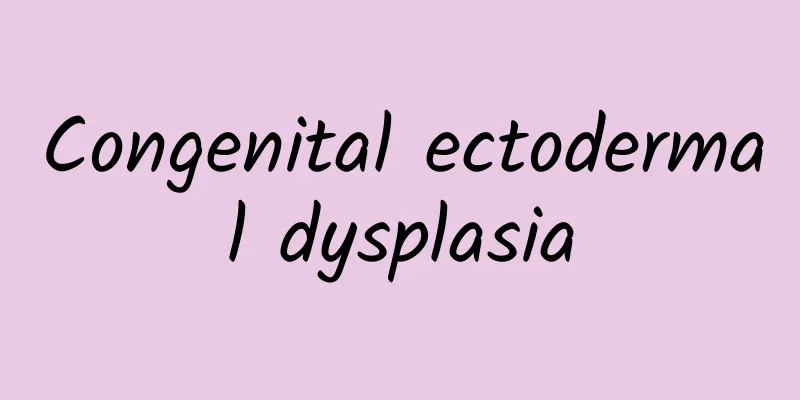Congenital ectodermal dysplasia

|
Congenital ectodermal dysplasia is a type of congenital disease that many people have not heard of. It is also called congenital ectodermal defect syndrome. Patients with this disease usually show abnormalities in the skin, teeth, eyes and other related central nervous systems. So for congenital ectodermal dysplasia, what are its main clinical manifestations, how is it diagnosed, and how should this disease be treated? 1. Clinical manifestations 1. Hypoplastic nails The symptoms of this disease are poor development of the nails, roughness and turbidity, depression in the center of the nail plate, dryness, brittleness or shedding, and chronic regenerative perionychia. 2. Fewer sweat glands and sebaceous glands The sweat glands and sebaceous glands are fewer than those of normal people, and the skin is thin, dry, and the palms and soles are excessively keratinized. 3. Missing teeth or poor tooth development. 4. Thin hair The vellus hair is sparse, thin or absent; the eyebrows are sparse or 2/3 hairless, and there are few eyelashes. 5. People with underdeveloped lacrimal glands It can easily cause dryness of the conjunctiva and cornea. 6. Others In addition, some cases are accompanied by mesodermal or endodermal developmental defects, such as syndactyly, ectopic fingers or polydactyly, mucosal atrophy and degeneration, loss of taste, hoarseness, atrophic rhinitis, loss of smell, etc. Clinically, there are two types of disease: sweating type and non-hidrosis type, and the symptoms of non-hidrosis type are more severe. Due to the inability to regulate body temperature, the high body temperature in summer may cause symptoms similar to heat stroke or heat stroke, and infants and young children may experience febrile convulsions. Some children have mental retardation. Clinically, there are often different degrees of expressivity and incomplete penetrance, and not every case has all the features. In addition, a small number of cases are combined with Friedreich ataxia, nystagmus, and brainstem developmental defects. 2. Diagnosis The presence of sweat glands, hair, and abnormally tapered teeth on the nail plate are very helpful in diagnosing this disease. Combined with sweat gland function tests and skin biopsy when necessary, the diagnosis can be confirmed. Treatment This syndrome is caused by ectodermal dysplasia, so there is no radical cure or special treatment. For the closed hidrosis type, especially infants and young children, they should be given a cool environment in summer and can be treated with a cold towel or rinsed with cool water if they have a fever to help dissipate heat and reduce the temperature. It is necessary to prevent high fever convulsions, infectious diseases, respiratory tract infections, etc. People with missing teeth can wear dentures to help with chewing and speaking. People with dry skin, local epidermal defects or adnexal defects should try to avoid adverse stimulation and trauma, and pay attention to preventing infection. In general, the goal of treatment is to help children adapt to their environment and establish a near-normal life. |
<<: One month after the abortion, the blood
>>: Why does chest pain occur when drinking water?
Recommend
Patellar tendinitis symptoms
Our bodies may seem strong, but they are also sus...
Cauliflower tumor of colon
Diseases related to colitis are particularly pron...
Blood sugar control range after tooth extraction
There are many taboos in tooth extraction. For ex...
Bilateral corona radiata cerebral infarction
As people age, they are bound to have some basic ...
What are the precautions for taking Huanglian Shangqing Tablets?
Spring is here, and with the arrival of various p...
Causes of orange peel-like changes in breasts
The main reason for orange peel-like changes in t...
Can I drink coffee if I have gastritis?
Nowadays, food is becoming more and more diverse,...
What to do if your eyes are lacking oxygen
Everyone should know that eye hypoxia is a very d...
Will bronchitis heal on its own?
Bronchitis refers to inflammation of the trachea ...
What to do if there is pus after burn scar
Common burns in life are divided into low-tempera...
What are the effects of Chinese medicinal material white chicken
The Chinese medicinal material Baiqi actually has...
What is the use of drinking dandelion in water?
Many people are very familiar with dandelions. In...
What to do if you have a terrible toothache in the middle of the night
I believe many of my friends have experienced sev...
Is eczema treatable?
Many people are concerned about how to continue t...
Red bumps on the body that are very itchy
Normally, we will get some bumps on our bodies. S...









